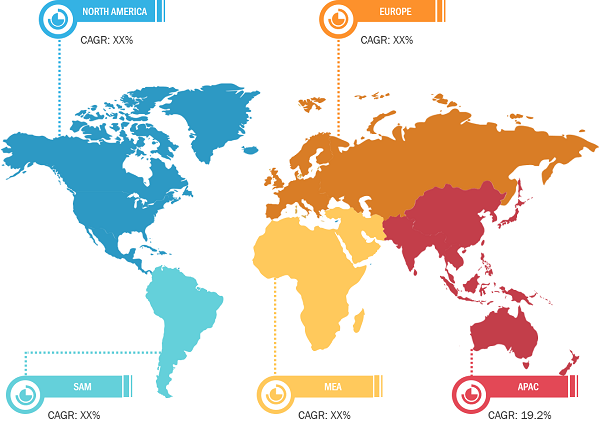Emergence of Smart Cities Expected to Provide Growth Opportunities for Smart Door Lock Market During 2022–2028
According to our latest market study on "Smart Door Lock Market Forecast to 2028 – COVID-19 Impact and Global Analysis – by Product, Technology, and End User," the market is expected to grow from US$ 2,733.05 million in 2023 to US$ 6,309.13 million by 2028; it is estimated to grow at a CAGR of 18.2% from 2023 to 2028.
According to the SmartAmerica Challenge, in February 2022, the US government announced that they would invest ~US$ 41 trillion till 2042 to upgrade their infrastructure by harnessing IoT capabilities. Similarly, in February 2023, the Ministry of Housing and Urban Affairs (MoHUA) announced that ~67.22% or 5,246 projects, valued at US$ 12.12 billion (INR 98,796 crore), of the total 7,804 Smart Cities Mission (SCM) projects, valued at ~US$ 22.24 billion (INR 181,322 crore), were complete as of January 2023. The remaining 32.77% or 2,558 projects, valued at US$ 10.12 billion (INR 82,526 crore), are scheduled for completion by June 2023. Such a rise in resource investments by governments of different countries in their respective smart city projects is likely to trigger the demand for smart solutions such as smart door locks in the coming years, fueling the smart door lock market growth.
Smart Door Lock Market — by Region, 2022
Smart Door Lock Market Forecast to 2028 - Global Analysis By Product (Fingerprint Locks, Remote Locks, and Electronic Cipher Locks), Technology (Wi-Fi, Bluetooth, Z Wave, and Others), and End User (Residential and Commercial)
Smart Door Lock Market Share and Growth by 2028
Download Free Sample
Source: The Insight Partners Analysis
The increased adoption of smart locks, coupled with ongoing investments in smart cities, is pushing the smart door lock market players to provide innovative solutions. For instance, in September 2022, Yale Home unveiled Yale Assure Lock 2, integrated with Bluetooth for at-home control and Wi-Fi to manage the lock remotely. It is also integrated with Z-Wave for Ring Alarm and Samsung SmartThings customers, and a Matter Smart Module, making it the first matter-compatible smart lock. Thus, the growing adoption of IoT-connected devices in smart homes is providing significant growth opportunities for the market.
The availability of efficient infrastructure in developed countries such as the US and Canada enables manufacturing companies to explore the limits of science, technology, and commerce. The US is characterized by the acceptance of modern technology, a high standard of living, the availability of well-developed infrastructure, and many other aspects of being a developed nation. Technological advancements have led to a highly competitive market across North America. To sustain this competition, key players in the market focus on innovation, new product launches, partnerships, and collaborations. For instance, in March 2023, KoreLock Inc, a US-based company, started offering turnkey smart lock solutions patented for a Wi-Fi- and radio-enabled control over the on and off state of a lock, delivering advanced intelligence and power savings. This power-saving feature is predicted to play an essential role in extending the battery life of locking devices.
Further, Wi-Fi-enabled intelligent door lock systems are gaining popularity in North America due to the well-established internet infrastructure and high internet penetration. As a result, several smart lock manufacturers are launching Wi-Fi-enabled locks to attract new customers. In January 2023, Schlag, one of the prominent providers of home security and access solutions, launched Schlage Encode Smart Wi-Fi Lever. This Wi-Fi-enabled smart lock can seamlessly integrate with other smart home technologies, Google Home, and Amazon Alexa. Developed countries such as US and Canada are the prominent revenue generators as the population is aware of the connected ecosystem and is capable of owning a premium system for security, comfort, and convenience. Thus, the growing adoption of Internet-based security solutions, increasing demand for smart homes, and rising urbanization are a few other significant factors contributing to the smart door lock market growth.
The smart door lock market size is segmented into product, technology, and end user. Based on platform, the smart door lock market size is segmented into fingerprint locks, remote locks, and electronic cipher locks. The smart door lock market, by technology, is categorized into Wi-Fi, Bluetooth, Z wave, and others. Based on end user, the market is bifurcated into commercial and residential.
Assa Abloy, Allegion plc, Miwa Lock co, Spectrum Brands, and Zigbang are a few key players profiled during the study on the smart door lock market. Several other major smart door lock market players were studied and analyzed during this market research study to get a holistic view of the market and its ecosystem. The smart door lock market report provides detailed market insights, which would help key players strategize their growth.
The COVID-19 pandemic raised the demand for contactless entry systems as consumers realized how critical it was to lower the risk of spreading germs through high-touch surfaces. The smart door lock market benefited from increased demand for contactless and remote access control solutions since they gave homeowners a convenient and secure option to regulate entry to their homes without needing touch. Concerns around social distancing and hygiene management are providing notable opportunities to companies in the smart door lock market as locking and unlocking operations of these locks are based on voice recognition, smartphones, and other smart devices, which results in a decreased need for physical contact with the devices. In 2020, Latchable, Inc. (US) launched LatchOS, an operating system for smart locks, which offers configurable smart-building solutions for various commercial and residential applications.
While the pandemic spurred demand for contactless access control solutions, it also caused disruptions in manufacturing and delivery operations. Moreover, economic uncertainty resulted in a low demand for high-end solutions such as electronics and semiconductors. Hence, the COVID-19 pandemic had a mixed impact on the North American smart door lock market.
Contact Us
Phone: +1-646-491-9876
Email Id: sales@theinsightpartners.com